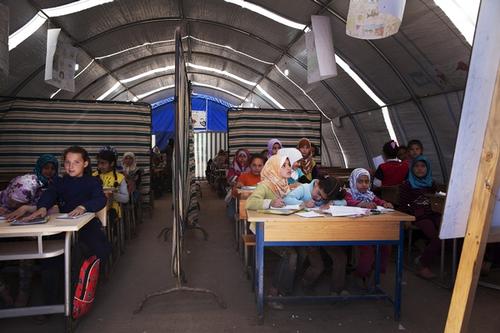A man comes out of a mosque in the north of Syria. It is the main Muslim place of worship for Syrians forced to leave their homes and now living in a camp alongside the Turkish border, in Aleppo province. A few months ago, 4,000 people were staying in this temporary settlement – now there are around 10,000. Most live in tents, but Hussein Alwawi and his family have found refuge inside the local mosque.
“We were living in the city of Aleppo,” says Hussein. “A warplane attacked our neighbourhood and lots of houses were destroyed, including ours. We were not at home at the time, but two families were killed. We stayed in Aleppo for five more days and then came here.”
Hussein’s story is similar to those of so many in the camp, where everyone is on the run from the war. Their tents are set up in a field formerly occupied by a customs office. Known officially as a ‘transit camp’, it is more accurate to call it a camp for internally displaced people. While some families do want to go to Turkey, many of them have been staying in the settlement for months and the camp’s population keeps on growing.
Teams from Médecins Sans Frontières (MSF) have carried out water and sanitation activities in the camp, and MSF medical staff have vaccinated more than 3,300 children under 15 against measles, a disease which can spread quickly in overcrowded conditions.
There are plenty of barbershops and food sellers in the camp, as well as schools for the displaced children. A group of children and adults play a football match with a basketball. An ambulance rushes past at high speed along the road next to the camp, on its way to take a wounded person from Syria to Turkey for medical attention. The football players don’t even look up from their game.
Not far from the football pitch, a group of women have gathered to talk. Saleha Mustafa, a 44-year-old Syrian, is heating lentil soup on a stove. “We came here because of the shelling and the helicopter attacks, and also because I’m a widow and I have nothing.” Saleha is reliant on the help of her cousins, who live in nearby tents. “I will go to Turkey if that’s what my family wants,” she says.
Mohammed is sipping a cup of coffee outside another tent. He is hoping to find shelter on the other side of the border. “I would like to go to Turkey with my family,” he says. “It is not safe here, there are constant clashes.”
Mohammed has been living in a tent for three months with his wife and five children. They fled the city of Aleppo because of the constant airstrikes and rocket attacks and because his children were afraid. He believes that the trauma from which his country is suffering will not be over any time soon. “The things going on in Syria right now will stay in the children’s minds for a long time to come,” he says.



